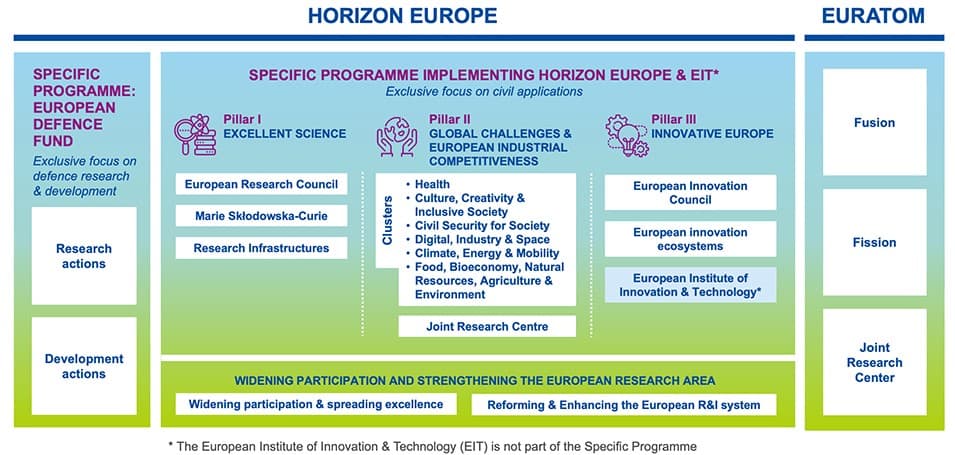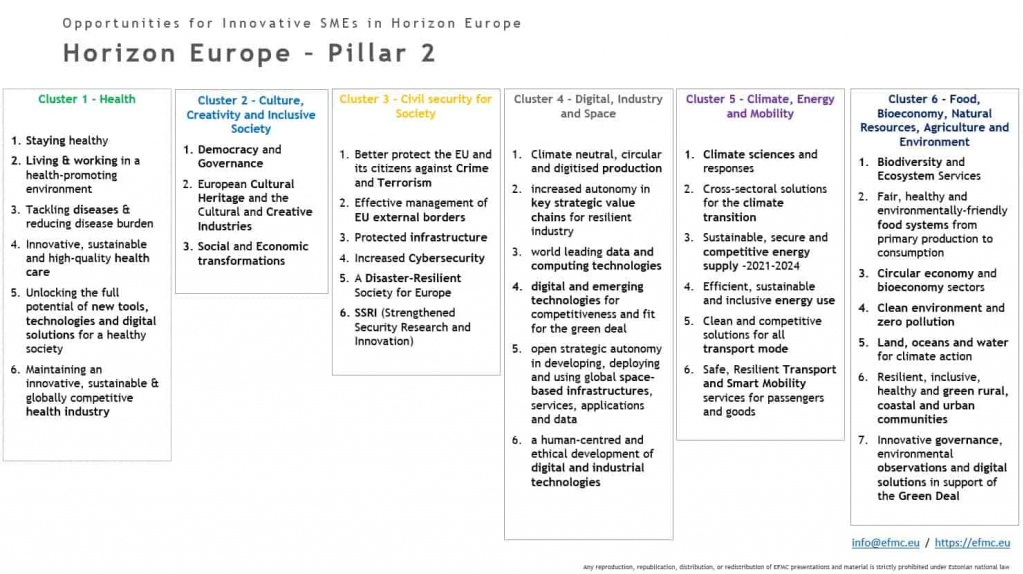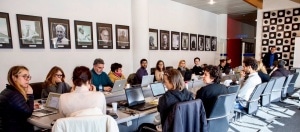Generations of research and innovation policy-makers have focused on clusters as a kind of panacea to promote and accelerate innovation. At least this was and often still is the case at the national level, as governments seek to concentrate innovation activities in physical clusters. But what is the new role of clusters in Horizon Europe? And how are they defined? To start with, there is a completely new language to learn, with terms like destinations. Once Horizon Europe finally launches, it will publish detailed information what key challenges each of the six clusters addresses. Here’s a summary of what we know so far from circulating draft documents.
Where do clusters fit into the Structure of Horizon Europe?
Horizon Europe is structured into three main pillars, for instance Pillar I Excellent Science and Pillar III Innovative Europe. While Pillar I covers fundamental research funded by the European Research Council and Marie Sklodowska-Curie Actions, Pillar III is dedicated to improving Europe’s innovation ecosystem and to commercialising innovation. Under Pillar II EU funding is provided to tackle global challenges and to boost Europe’s industrial competitiveness. That’s where the clusters come in.
The structure of Horizon Europe lists a total of six clusters that are broken down into individual expected impacts around overarching themes. The six clusters are
- Cluster 1: Health
- Cluster 2: Culture, Creativity & Inclusive Society
- Cluster 3: Civil Security for Society
- Cluster 4: Digital, Industry & Space
- Cluster 5: Climate, Energy & Mobility
- Cluster 6: Food, Bioeconomy, Natural Resources, Agriculture & Environment

Source: European Commission: Pillar II and the six clusters in the Horizon Europe framework
Draft work programmes on various research and innovation areas indicate the desired impacts – the European Commission refers to them as destinations – which will be addressed in EU calls for proposals. The clusters in Horizon Europe are not so much clusters with a physical location, where a critical mass of innovation activity is concentrated. Instead, clusters address specific policy aims that the European Commission seeks to achieve by providing EU grants for research and innovation. For instance, Cluster 1 – Health is closely linked to the aim of a fairer, inclusive and more social Europe that offers equal opportunities for everyone and an economy that works for the people. One aspect of this is innovative technologies to improve health care.

Source: EFMC: Overview of Clusters and their desired impacts
What’s new about the Horizon Europe clusters?
While previous framework programmes were activity-driven, Horizon Europe takes an impact-driven approach to promoting research and innovation. This is based on four strategic orientations and a number of impact areas. These are broken down into 30 expected impacts that will be addressed by specific actions under thematic Horizon Europe work programmes (WPs), drafts of which are already circulating. These expected impacts are also referred to as destinations, i.e. the specific directions and ultimate points of arrival Horizon Europe aims to achieve. Ultimately, the destinations in each cluster set out what the European Commission hopes to achieve by supporting research and innovation activities within and across individual clusters.
For instance, one destination in Cluster 4: Digital Industry & Space is greater autonomy in important strategic value chains to make the industry more resilient. This destination supports a number of key strategic objectives (KSOs) that are outlined in the EU’s Strategic Plan for implementing Horizon Europe. In the above example, the strategic objectives include a range of goals such as strengthening the circular, climate-neutral and sustainable economy by use of digital technologies. EU calls for proposals will focus on topics that will contribute to these strategic objectives. The relevant draft work programme therefore includes the Research and Innovation Action (RIA) “Ensuring circularity of composite materials”. Grant proposals will need to set out how the expected impacts, aka destinations, will be achieved.
There is an additional dimension to the EU’s cluster approach in Horizon Europe, as the clustering of projects as well as joint coordination and dissemination activities will need to be part of the funded actions. Examples are joint workshops, knowledge exchange, best practices and exploring synergies. Grant applicants will have to budget for such activities in EU grant proposals, without having to spell them out in detail. Joint activities will be defined at a later stage during the grant preparation phase. Additionally, research and innovation synergies between individual destinations within a single cluster need to be explored via cross-sectoral collaboration. For instance, Cluster 1 Health and Cluster 3 Civil Security for Society have common themes such as pandemic preparedness and protection from bioterrorism.
All about the novel features in Horizon Europe packed into a one-day seminar
While clusters may seem an established concept, Horizon Europe uses them in a novel, strategic way. Learn more about this and other new features in EFMC’s Horizon Europe Training. This one-day training on 2 and 26 March 2021 is suitable for everyone, including the most experienced project managers. The Horizon Europe Training Agenda covers
- Corporate approach to the MGA: new MGA, new Form, Special Status participants, affiliated entities, associated partners
- New approach to project costs – traditional budget vs. new lump sum
- New calculation of personnel costs based on daily rate
- New control strategy
- UK withdrawal – current state of affairs and future scenarios
- Eligibility (eligible entity, eligible country, eligible costs for funding)
Winning EU grants with the help of EFMC training
You need a more concise overview of what’s new in Horizon Europe? EFMC summarizes the most important novelties in a 1,5-hour Webinar on 5 and 19 March 2021. EFMC also has developed a comprehensive 2-3-day training via Zoom on the proposal writing process for Horizon Europe projects. Save a seat on 23-25 March or 4-6 May 2021!
You would prefer bespoke training? Contact us for in-house trainings on Financial Management, Proposal Writing, Horizon Europe and/or SEDIA to get a quotation. Reach out to us at info@efmc.eu or by phone on (+372) 604 1400.




